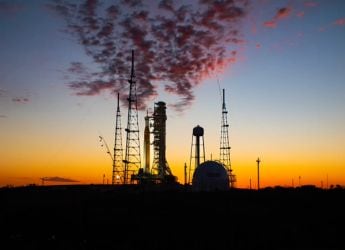- Home
- Science
- Science News
- NASA Considering Second Moon Lander for Artemis Mission Alongside SpaceX’s Starship
NASA Considering Second Moon Lander for Artemis Mission Alongside SpaceX’s Starship
NASA plans to use the Moon as a launchpad for future missions farther in space – like reaching Mars.

Photo Credit: Twitter/ @NASAArtemis
NASA roped in SpaceX to build Starship in April 2021
NASA plans to use multiple private spacecraft to land astronauts on the Moon under its ambitious Artemis project. Initially, it had picked only the Elon Musk-owned SpaceX but it seems the US space agency has been rethinking its strategy. The agency, this week, announced that it wanted to support the development of a second privately built Moon lander to ferry astronauts. The Artemis programme is intended to land humans on the Moon after more than three decades and build a sustainable presence there by the end of this decade. NASA plans to use the Moon as a launchpad for future missions farther in space – like reaching Mars.
NASA will release a draft solicitation in the coming weeks to bring a second contender into the market for the development of a lunar lander alongside SpaceX. This activity will lay out the requirements for a future lunar landing capability that will ferry astronauts between orbit and the Moon's surface.
“We expect to have two companies safely carry astronauts in their landers to the surface of the Moon under NASA's guidance before we ask for services, which could result in multiple experienced providers in the market,” said Lisa Watson-Morgan, Programme Manager for the Human Landing System Programme at NASA's Marshall Space Flight Centre in Alabama, in a statement.
Watson-Morgan added that this strategy expedites progress toward a long-term, sustaining lander capability by 2026-27.
To reach the Moon and beyond, NASA needed a powerful rocket. So, it started building one of its own — the Space Launch System. The space agency also roped in SpaceX to build another one — Starship — in April 2021. Both the rockets are nearing completion and final tests are likely to happen soon.
The plan to have multiple rocket systems for crewed missions isn't new. NASA had planned to have multiple private Moon landers for Artemis, to drive competition, and have backups; but it lacked funds. In a budget amendment in 2019, NASA had reported that it needed an additional $1.6 billion (roughly Rs. 12188.88 crore) in funding to be on schedule for a human return to the Moon by 2024.
So, it went ahead solely with SpaceX, inviting protests from other players, including Jeff Bezos' Blue Origin, which even sued the US government in August 2021 after NASA awarded a $2.9-billion (roughly Rs. 21,540 crore) lunar lander contract to SpaceX. It appears NASA now has assurances that it will have the funds for a second private lander.
Get your daily dose of tech news, reviews, and insights, in under 80 characters on Gadgets 360 Turbo. Connect with fellow tech lovers on our Forum. Follow us on X, Facebook, WhatsApp, Threads and Google News for instant updates. Catch all the action on our YouTube channel.
Related Stories
- Samsung Galaxy Unpacked 2026
- iPhone 17 Pro Max
- ChatGPT
- iOS 26
- Laptop Under 50000
- Smartwatch Under 10000
- Apple Vision Pro
- Oneplus 12
- OnePlus Nord CE 3 Lite 5G
- iPhone 13
- Xiaomi 14 Pro
- Oppo Find N3
- Tecno Spark Go (2023)
- Realme V30
- Best Phones Under 25000
- Samsung Galaxy S24 Series
- Cryptocurrency
- iQoo 12
- Samsung Galaxy S24 Ultra
- Giottus
- Samsung Galaxy Z Flip 5
- Apple 'Scary Fast'
- Housefull 5
- GoPro Hero 12 Black Review
- Invincible Season 2
- JioGlass
- HD Ready TV
- Latest Mobile Phones
- Compare Phones
- Tecno Pova Curve 2 5G
- Lava Yuva Star 3
- Honor X6d
- OPPO K14x 5G
- Samsung Galaxy F70e 5G
- iQOO 15 Ultra
- OPPO A6v 5G
- OPPO A6i+ 5G
- Asus Vivobook 16 (M1605NAQ)
- Asus Vivobook 15 (2026)
- Brave Ark 2-in-1
- Black Shark Gaming Tablet
- boAt Chrome Iris
- HMD Watch P1
- Haier H5E Series
- Acerpure Nitro Z Series 100-inch QLED TV
- Asus ROG Ally
- Nintendo Switch Lite
- Haier 1.6 Ton 5 Star Inverter Split AC (HSU19G-MZAID5BN-INV)
- Haier 1.6 Ton 5 Star Inverter Split AC (HSU19G-MZAIM5BN-INV)







![[Partner Content] OPPO Reno15 Series: AI Portrait Camera, Popout and First Compact Reno](https://www.gadgets360.com/static/mobile/images/spacer.png)









